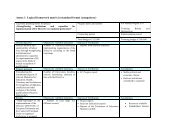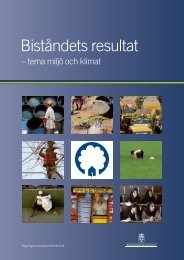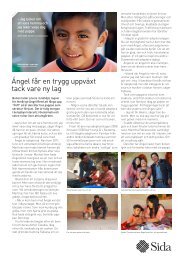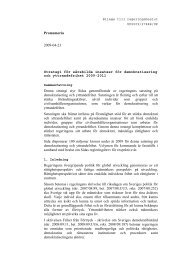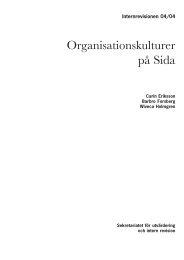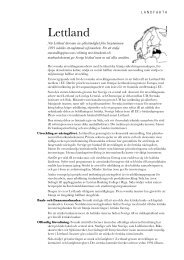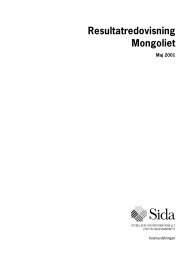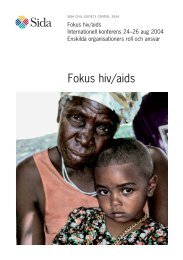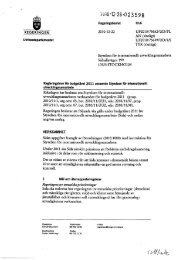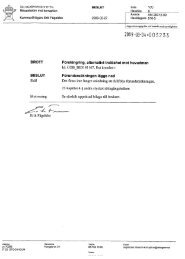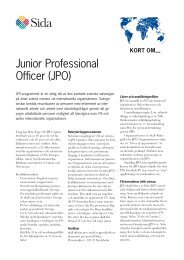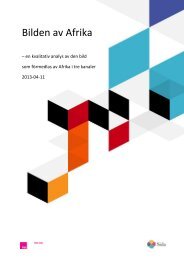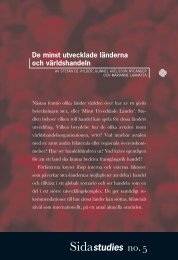Mid-Term Review of the AGIR Programme - Sida
Mid-Term Review of the AGIR Programme - Sida
Mid-Term Review of the AGIR Programme - Sida
You also want an ePaper? Increase the reach of your titles
YUMPU automatically turns print PDFs into web optimized ePapers that Google loves.
1 I N T R O D U C T I O N<br />
ited number <strong>of</strong> qualified intermediary organisations within <strong>the</strong> following four clusters<br />
<strong>of</strong> support:<br />
i) Participation, social and legal accountability, including monitoring <strong>of</strong> respect<br />
for human rights;<br />
ii) Social accountability in management <strong>of</strong> natural resources and community<br />
land rights;<br />
iii) Transparency, financial and political accountability; and,<br />
iv) Promotion <strong>of</strong> access to information.” 10<br />
Emerging out <strong>of</strong> <strong>the</strong> dialogue surrounding <strong>the</strong> production <strong>of</strong> <strong>the</strong> document “Guidelines:<br />
The Swedish Embassy’s Support to Mozambican Civil Society Organisations”<br />
(2009), three INGO intermediaries were initially identified that had ongoing programmes<br />
in <strong>the</strong> <strong>the</strong>matic areas that coincided with <strong>the</strong> Embassy’s cooperation strategy.<br />
Each <strong>of</strong> <strong>the</strong>se three key actors, or ‘intermediaries’ – Oxfam Novib (International<br />
Non-Governmental Organisation, Dutch), IBIS (International Non-Governmental<br />
Organisation, Danish) and Diakonia – was approached in mid-2009, with a fourth<br />
INGO, SCC (International Non-Governmental Organisation, Swedish Cooperative<br />
Center), added in 2011. 11 Each was encouraged to submit proposals in line with <strong>the</strong><br />
<strong>the</strong>matic focus areas and “support modalities outlined in <strong>the</strong> guidelines.”<br />
A central facet <strong>of</strong> <strong>AGIR</strong> is that while each intermediary works within what is considered<br />
a ‘sub-component’ <strong>of</strong> <strong>the</strong> overall programme, ‘strong joint features’ are shared.<br />
The commonalities shared by <strong>the</strong> intermediaries include:<br />
i) The establishment <strong>of</strong> a division <strong>of</strong> labour between <strong>the</strong> three organisations,<br />
between and within <strong>the</strong> <strong>the</strong>matic “clusters”;<br />
ii) The development <strong>of</strong> a joint programme results framework as well as <strong>the</strong> definition<br />
<strong>of</strong> joint capacity development activities;<br />
iii) A joint MOU (Memorandum <strong>of</strong> Understanding) that regulates <strong>the</strong> interaction<br />
between <strong>the</strong> three partners; and<br />
iv) Definitions on how to coordinate work around <strong>the</strong> Paris agenda and to<br />
streng<strong>the</strong>n linkages between each o<strong>the</strong>rs’ CSO partners.” 12<br />
10 The Swedish Embassy’s Support to Mozambican Civil Society Organisations, p.7; 2009.<br />
11 The Swedish Cooperative Center – SCC began its participation in <strong>AGIR</strong> in 2011, one year later than<br />
<strong>the</strong> three original intermediaries. The initial agreement listed <strong>the</strong> intermediaries <strong>of</strong> Diakonia, IBIS, Oxfam<br />
(while SCC was not in mentioned in <strong>the</strong> initial programme proposal, <strong>the</strong> area within which it works was<br />
mentioned as an area that was to be added – Social Accountability in Natural Resource Management).<br />
According to discussions with SCC staff, its late entry into <strong>the</strong> <strong>AGIR</strong> programme was due to <strong>the</strong> requirede<br />
criteria that <strong>AGIR</strong> CSO partners should have a national perspective, whereas SCC has worked<br />
primarily from a local perspective with partners.<br />
12 Streng<strong>the</strong>ning Civil Society – Enhancing Democratic Governance, p.5, 2010. <strong>Sida</strong>.<br />
23



